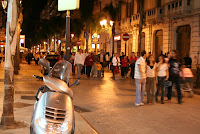I appreciate her writing and her wit equally and was thrilled when my friend Heather, who introduced me to Anne's writing long ago, alerted me to the author's local visit last night.
 |
| Anne Lamott signing books and chatting with guests. |
"I love to write about what I come upon and I love to come upon spiritual stuff," she shared. Books about truth, resurrection, healing - these fill her huge heart.
The "Help" in the book title is probably the most common prayer. Life tosses us all sorts of hot potatoes. When the juggling gets dicey, we ask for help. This prayer has many faces when I beg, cry, scream, demand or negotiate for it. It is the Wild West of prayers - anything goes. Anne's experience in recovery has kept this prayer active for her. "It's when you've made such a catastrophe of your life and have run out of options that you allow yourself to be helped," she noted.
"Gratitude is a habit," she said regarding the second prayer of the title. "It's irresistible." The author joked about often being scattered in thought but on this point her clarity shimmered. Gratitude is not just for the good times.
 |
| Author Anne Lamott |
''Wow" is the prayer for everything else. "You don't go outside and see a starry night and say 'eh,' Anne said with a tilt of her head. "You say wow!.'" Recognizing those moments is the task. "To us much is given, we just have to be open for business," she writes.
Anne touched on aging, body image, recovery, her son Sam and her writing process - each infused with her well-honed humor. "The grace of getting older is that you get you back," she stated. "No one notices your butt, no one cares. Get on with it."
Anne converted to Christianity 27 years ago - she was drunk. "I got sober 26 years ago - I call that 12 months in between my gap year," she wryly added.
A question about Advent and holidays prompted Anne to discuss her anxiety over the hype of the holidays and her conviction that we need to be lights to one another. "Be a lighthouse," she suggested. "Stay lit. Lighthouses don't go running around the island looking for ships to save," she added "They simply stay lit." Light was a consistent theme during her talk.
In the hour before the event start time, Anne made her way all through the church signing books, talking, listening, connecting. It was warm, easy, welcoming. She is accessible without giving up her essential self.
She closed her talk stating what seemed to be her strongest conviction, "You are loved and chosen exactly as you are, exactly as you are."
"You know how vulnerable we are. It's not out there. You're not going to find it , lease it or date it.
Grace is knowing you can stop the mad scrambling after things." Anne Lamott





